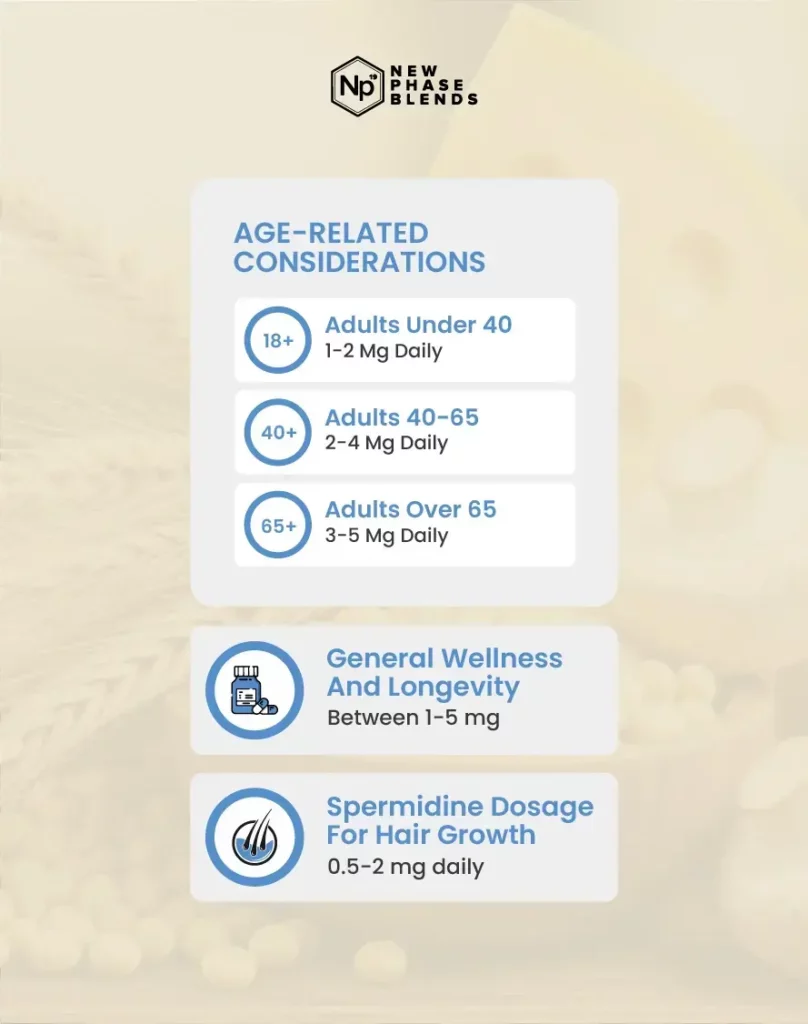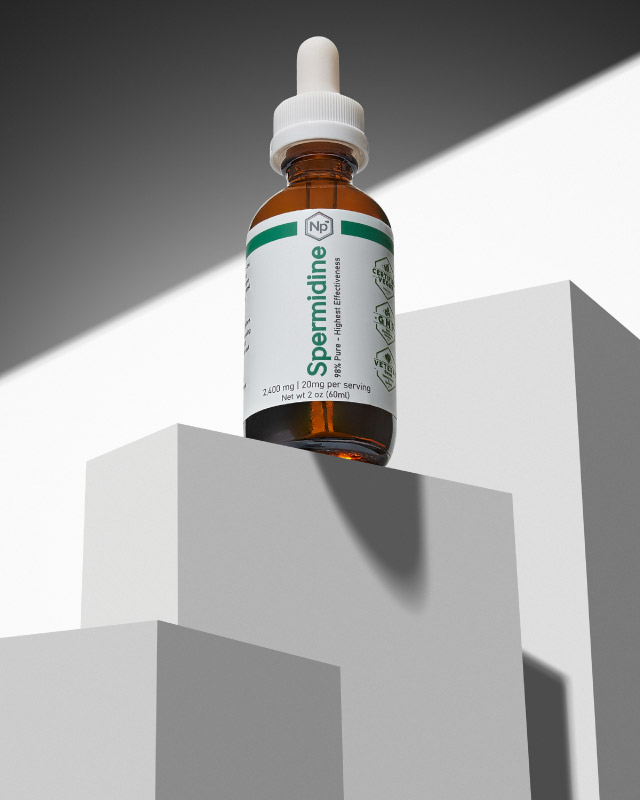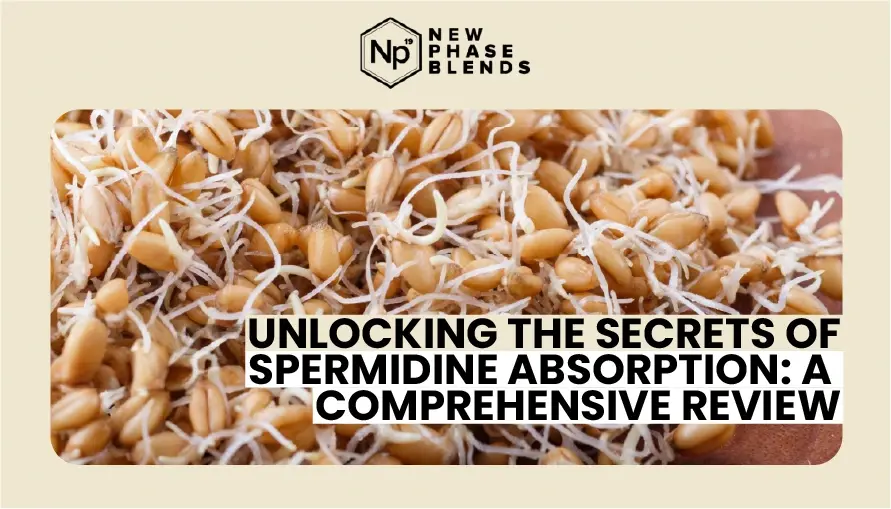Are you considering spermidine supplements but unsure about the right dosage? You’re not alone. As interest in this natural compound grows, more people are seeking clear guidance on how much spermidine to take for optimal results. Whether you’re looking to support longevity, improve hair growth, or explore its other potential benefits, understanding the proper spermidine dosage is essential for safety and effectiveness.
In this comprehensive guide, we’ll explore evidence-based recommendations for spermidine supplementation, drawing on the latest research and expert insights. You’ll discover not just how much to take, but also when and how to incorporate spermidine into your wellness routine for maximum benefit.
Recommended Spermidine Dosage for Different Health Goals

Finding the right spermidine dosage depends largely on your specific health objectives. Let’s break down the current research-backed recommendations for different purposes:
General Wellness and Longevity: Spermidine Dosage for Daily Maintenance
For those interested in spermidine’s potential longevity benefits, research suggests a daily intake between 1-5 mg. This range appears to support autophagy and cellular health without excessive supplementation.
Most longevity studies showing positive results have used doses within this range. A notable study published in the journal Nature Medicine found that even modest increases in spermidine intake were associated with lower mortality rates and increased lifespan in human population studies.
For context, a typical diet provides approximately 7-15 mg of spermidine daily, though this varies widely based on food choices. Supplementation can help ensure consistent intake, particularly for those whose diets may be lower in natural spermidine sources.
Spermidine Dosage for Hair Growth: What the Research Shows
If your primary interest is hair health, the recommended spermidine dosage may differ slightly. Studies focusing on hair growth have typically used doses ranging from 0.5-2 mg daily.
A 2017 study published in the International Journal of Molecular Sciences found that a daily dose of approximately 1 mg of spermidine was associated with increased hair shaft elongation and prolonged growth phase in hair follicles. Participants reported visible improvements in hair density and thickness after 3 months of consistent supplementation.
When taking spermidine specifically for hair benefits, patience is key—noticeable results typically require at least 90 days of consistent supplementation, with some individuals reporting best results after 6 months.
Spermidine Dosage for Weight Management
While spermidine is not primarily marketed as a weight loss supplement, some research suggests it may support metabolic health. Studies in this area have typically used doses in the 3-5 mg range.
Spermidine’s potential weight management benefits appear to work through several mechanisms:
- Enhanced autophagy, which improves cellular efficiency
- Potential modulation of hunger hormones
- Improved mitochondrial function, potentially enhancing energy expenditure
It’s important to note that spermidine supplementation for weight management should be viewed as a complementary approach alongside proper nutrition and regular physical activity, not as a standalone solution.
Why Consider Spermidine Supplementation?
Spermidine is a naturally occurring polyamine compound found in various foods and produced within our bodies. Named after its initial discovery in semen, this compound is now recognized for its presence in a wide range of foods including wheat germ, soybeans, aged cheese, and mushrooms.
The interest in spermidine has surged in recent years due to its association with autophagy—the body’s cellular cleaning process that removes damaged cell components. This process is believed to play a critical role in healthy aging and longevity. As we age, our natural spermidine levels tend to decline, which has led many to consider supplementation.
How to Determine Your Optimal Spermidine Dosage
Finding your personal optimal dosage involves several considerations beyond just the general guidelines:
Age-Related Considerations
Age is an important factor in determining appropriate spermidine dosage. Natural spermidine production tends to decline with age, which may influence supplementation needs:
- Adults under 40: Generally, the lower end of dosage ranges (1-2 mg daily) may be sufficient
- Adults 40-65: Moderate dosages (2-4 mg daily) may be appropriate
- Adults over 65: Higher dosages (3-5 mg daily) might be beneficial due to natural decline in production
These recommendations should be adjusted based on individual health status and goals.
Body Weight and Metabolism
Your body weight and metabolic rate can influence how your body processes supplements. While specific weight-based dosing guidelines haven’t been established for spermidine, the general principle that larger individuals may require slightly higher doses can be applied.
A starting approach might be:
- Under 150 lbs: Begin with lower end of recommended dosage
- 150-200 lbs: Consider middle range dosages
- Over 200 lbs: May benefit from upper range dosages
Always start with the lower end of recommendations and gradually increase as needed.
Timing: When to Take Your Spermidine Supplement
When you take spermidine can impact its effectiveness. Current research suggests several optimal approaches:
Morning vs. Evening Supplementation
Many experts recommend taking spermidine supplements in the evening. This timing aligns with the body’s natural autophagy processes, which tend to increase during overnight fasting periods while we sleep.
However, some individuals report better results with morning supplementation, particularly when using spermidine for energy and cognitive benefits. There’s no definitive rule—personal experimentation may help determine what works best for your body.
With or Without Food
Spermidine supplements are typically better absorbed when taken with food, particularly meals containing healthy fats. This is because polyamines like spermidine are fat-soluble to some degree, and dietary fat can enhance absorption.
If you experience any digestive discomfort when taking spermidine on an empty stomach, switching to taking it with meals may help resolve this issue.
Common Mistakes to Avoid with Spermidine Supplementation
When beginning a spermidine regimen, be aware of these potential pitfalls:
Inconsistent Supplementation
Perhaps the most common mistake is irregular supplementation. The benefits of spermidine appear to be cumulative and depend on maintaining consistent levels in the body. Sporadic usage is unlikely to produce noticeable results.
For best outcomes, establish a daily routine for your supplementation. Many users find setting a specific time or pairing the supplement with an existing daily habit (like brushing teeth or having breakfast) helps maintain consistency.
Expecting Immediate Results
Spermidine works primarily through cellular mechanisms that take time to produce visible or feelable effects. Most research shows that noticeable benefits typically begin appearing after 2-3 months of consistent supplementation.
Setting realistic expectations is important—spermidine is not a quick fix but rather a long-term approach to cellular health and function.
Does Spermidine Come With Side Effects?
At recommended dosages, spermidine supplements are generally well-tolerated by most individuals. However, being aware of potential side effects of spermidine is important for any supplementation regimen.
Some users report mild digestive discomfort when first beginning supplementation. This typically resolves as the body adjusts to the supplement. Starting with a lower dose and gradually increasing can help minimize this effect.
There are some theoretical concerns about spermidine’s effect on existing cancerous cells, as autophagy promotion might potentially benefit both healthy and unhealthy cells. However, population studies have not shown increased cancer risk with higher dietary spermidine intake. In fact, some research suggests spermidine may have protective effects against cancer development.
Conclusion: Finding Your Personal Spermidine Protocol
The optimal spermidine dosage varies based on individual factors including age, health status, and specific goals. For most adults, a daily dosage of 1-5 mg provides a reasonable starting point, with adjustments made based on response and specific health objectives.
Remember that supplementation works best as part of a comprehensive approach to health that includes proper nutrition, regular physical activity, quality sleep, and stress management. Spermidine’s benefits appear most pronounced when these foundational health practices are already in place.
As with any supplement, consulting with a healthcare provider before beginning spermidine supplementation is advisable, particularly for individuals with existing health conditions or those taking medications. Your healthcare provider can help determine if spermidine is appropriate for your specific situation and help monitor for any potential interactions or effects.
With patience and consistency, spermidine supplementation may become a valuable component of your long-term health strategy, potentially supporting cellular health, longevity, and specific health objectives like hair growth or metabolic function.





















